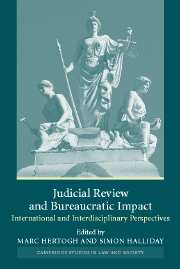Book contents
- Frontmatter
- Contents
- Acknowledgments
- Notes on the contributors
- Introduction
- Part One Conceptual and methodological issues
- Part Two International case studies
- 4 Impact studies in the United Kingdom
- 5 The politics of soft law: how judicial decisions influence bureaucratic discretion in Canada
- 6 The operation of judicial review in Australia
- 7 Legalising the unlegaliseable: terrorism, secret services and judicial review in Israel 1970–2001
- 8 Implementing court orders in the United States: judges as executives
- Part Three The future of judicial review and bureaucratic impact
- Bibliography
- Index
8 - Implementing court orders in the United States: judges as executives
from Part Two - International case studies
Published online by Cambridge University Press: 29 July 2009
- Frontmatter
- Contents
- Acknowledgments
- Notes on the contributors
- Introduction
- Part One Conceptual and methodological issues
- Part Two International case studies
- 4 Impact studies in the United Kingdom
- 5 The politics of soft law: how judicial decisions influence bureaucratic discretion in Canada
- 6 The operation of judicial review in Australia
- 7 Legalising the unlegaliseable: terrorism, secret services and judicial review in Israel 1970–2001
- 8 Implementing court orders in the United States: judges as executives
- Part Three The future of judicial review and bureaucratic impact
- Bibliography
- Index
Summary
INTRODUCTION
Since at least the publication of Richard Neustadt's book, Presidential Power, it has been commonplace to observe that few policies are self-executing, and that chief executives have only very limited abilities to accomplish their objectives. Indeed, a generation ago, a new field of research, implementation studies, emerged to address this issue. In their book, Implementation, that did much to establish this field, Jeffrey Pressman and Aaron Wildavsky proposed to stand a central question of public administration on its head. Rather than ask, ‘Why do some policies fail?’, they asked, ‘Why do some policies occasionally succeed?’
Variations on this theme are now common in the American literature on public administration. In his classic book, Street Level Bureaucracy, Michael Lipsky attributes the routinisation of policy failure to two features of contemporary bureaucratic life: (1) the vast ‘distance’ between those who formulate formal policy – legislatures, chief executives, agency heads – and those who provide street level service; and (2) the vast discretion that these service providers exercise. In her study of federal policies to counter employment discrimination, Kirsten Bumiller argues that legal remedies are empty gestures, designed to give the appearance of doing something while reinforcing the status quo. More generally, the late Murray Edelman elaborated a theory of policy failure, whose central thesis is captured in the titles of his books: The Symbolic Uses of Politics, Words that Succeed But Policies that Fail and Constructing the Political Spectacle.
- Type
- Chapter
- Information
- Judicial Review and Bureaucratic ImpactInternational and Interdisciplinary Perspectives, pp. 221 - 248Publisher: Cambridge University PressPrint publication year: 2004
- 4
- Cited by



